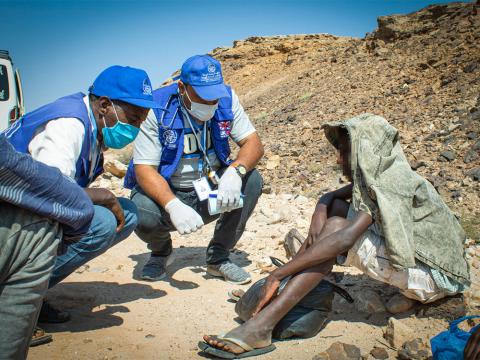
The International Organization for Migration (IOM) is increasingly concerned about the serious impact that funding shortages could have on the ability of migrants to survive the looming famine and the ongoing pandemic.
IOM’s health programme in Yemen is underfunded by USD 30 million and, with such severe financial constraints, the Organization has been forced to refocus its programming and reduce assistance in certain locations. This reduction will be particularly hard felt in cities like Aden and Marib, which host thousands of migrants in dire need of support.
Access to healthcare for migrants across the country is exceptionally limited, often with migrants only able to access support through humanitarian aid provided by agencies such as IOM. In Marib, 84 per cent of migrants currently do not have any access to health care.
“Funding shortages have affected IOM assistance to both migrants and displaced people. Migrants being one of the most vulnerable groups in Yemen, but we are one of the few organizations supporting them,” said Christa Rottensteiner, IOM’s Chief of Mission in Yemen.
“The limited support for migrants is extremely worrying. For some, the impact of the gaps in the response could be deadly.”
These difficulties that migrants face in accessing health care are contextualized in a country where only 50 per cent of health facilities are fully functional and migrants are not entitled to free public health care.
In addition to health care, migrants are in dire need of food, shelter and water. In Marib, 60 per cent of migrants do not have access to food. The situation has deteriorated so much that migrants are putting their lives back into the hands of smugglers who have abused, tortured and exploited them for support to get home to the Horn of Africa, including to Ethiopia and Somalia.
Over 5,600 migrants have travelled by sea from Yemen to Djibouti since May, in a desperate attempt to get home. Some have tragically drowned on their journeys.
“For nearly six years, Yemen has been an extremely unsafe place for migrants. Now, COVID-19 has made their situation worse, as migrants are scapegoated as carriers of the virus and most do not have access to basic assistance,” added Rottensteiner.
“We hope the international community will step up and help us assist and protect migrants. We also need to ensure that all plans to respond to this crisis include migrants.”
Source: iom.int







